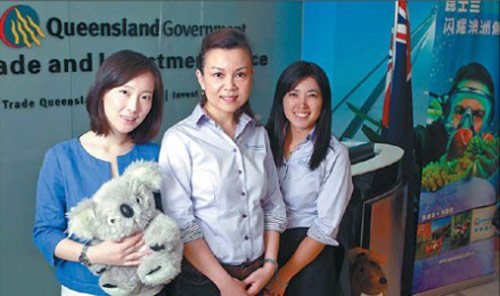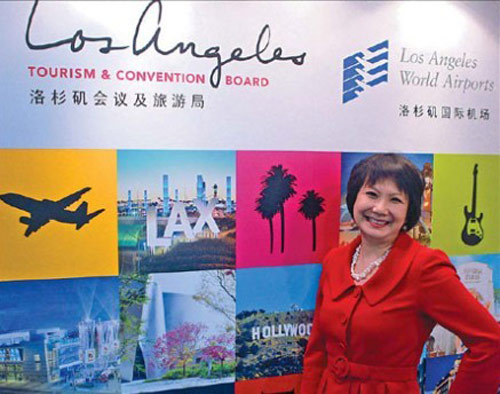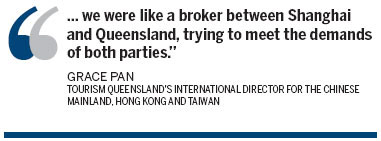
 |
|
Grace Pan (center), Tourism Queensland's international director for the Chinese mainland, Hong Kong and Taiwan, and her colleagues in their Shanghai office. Photos by Gao Erqiang and Feng Yongbin / China Daily |
 |
|
Jamie Lee, regional director of the Los Angeles Tourism & Convention Board's Beijing office. Photos by Gao Erqiang and Feng Yongbin / China Daily |

There are many routes to enjoying success in the domestic market, Hu Yongqi reports in Beijing.
Despite being raised in a Chinese family in California, Jamie Lee regarded herself as a Westerner before she moved to Beijing 15 years ago. She was unable to speak Chinese and had no clue about the country's traditions. All she knew was US culture.
However, since 1997 she has learned the language and local business methods after working as a manager in a dental hospital in the capital.
"The way Chinese officials and travelers interact with each other is very different from the Americans I was familiar with," she said. "I had to learn everything from Chinese friends and then adapt that knowledge to business situations."
In 2005, Antonio Villaraigosa, the mayor of Los Angeles, recognized the potential of China's market. Villaraigosa's interest resulted in the establishment of the Los Angeles Tourism and Convention Board's Beijing office.
In 2006, Lee joined the office as regional director, heading up a team to promote LA as a destination for Chinese tourists. "Many people thought the board could hire a public relations company or an agent to promote our services. But the mayor decided that a dedicated office was essential, otherwise our services would not always be the main focus," she said.
Through the work of Lee's office, the number of Chinese visitors to LA has increased by 50 percent every year since 2006, rising to 130,000 in 2011.
In the past six years, the office - the only cultural and business exchange bureau established by a foreign city in Beijing - has functioned as a bridge connecting the cities, said Lee.
Currently, more than 100 offices have been established by foreign governments - mostly at state level - in Beijing, Shanghai and Hong Kong to promote trade and services. Most of the offices have a localized feel, with a chief representative and two or three Chinese employees.
The offices undertake specific tasks, such as investment promotion, to find new consumers and investors. They help overseas businesses to understand the local policies related to trade or investment, such as taxation and land rents.
Close to the customer
Beijing is one of four overseas offices the LA Tourism & Convention Board has established. Compared with hiring local agencies, foreign governmental departments have discovered the benefits of setting up offices in China.
The German National Tourist Board has two bureaus in China, one in Beijing and the other in Hong Kong. "We felt it was important to be in the market and close to the consumers and the local travel industry. We also need to understand the demands, the changes and the trends, and try to position our brand and products successfully," said Oliver Sedlinger, marketing director of the Beijing office.
Sedlinger said China's rapid economic development and rising incomes have made the country a vital market for the German tourism industry. During the past decade, the number of overnights by Chinese visitors to Germany has doubled. In 2010, China overtook Japan as the strongest source market in Asia. Last year, Germany saw overnights from Chinese customers increase by 21 percent from 2010.
Being based in Beijing means that Sedlinger and his colleagues are able to visit a wide range of second- and third-tier cities where they can inform Chinese travel companies about Germany's resources, provide them with contacts with German suppliers and help them design attractive and successful travel packages.
Sedlinger said German hotels and service providers are working hard to improve and adapt their products and services to the needs of Chinese travelers.
Jamie Lee holds the same view as Sedlinger, emphasizing that the travel industry in the US, and other countries, has to learn about the habits of Chinese consumers.
Lee said the Chinese always speak loudly and are known to "invade personal space" during conversations. Moreover, Chinese travelers must have hot drinking water in hotels and restaurants, while Westerners are more accustomed to drinking cold water.
"This sort of behavior isn't odd or offensive, just convention. So I have to tell service providers in Los Angeles how to adjust properly," said Lee. "That's what we do - reduce the differences as much as we can."
Casual travel
Tina Yao, chief representative of Hawaii Tourism China in Shanghai, said her employees regularly attend exhibitions such as the annual China Wedding Expo and international tourism fairs in Shanghai and other cities. In doing so, the office publicizes Hawaii and its tourism, said Yao.
"Compared with business trips, this form of travel is casual and can help people interact. Once contact has been established, other business can be introduced," said Lee.
She said her office also functions as an economic exchange and cultural ambassador. In addition to promoting simple tourist packages, the LA Tourism & Convention Board has organized for 100 Beijing students to sing in LA schools as part of an exchange program.
Grace Pan, Tourism Queensland's international director for the Chinese mainland, Hong Kong and Taiwan, said promotion is hard work, although Chinese travelers are keenly aware of Queensland's tourist highlights, such as the Great Barrier Reef.
Previously, Chinese visitors heading to Queensland had to transfer in Singapore, no matter which airline they used. Pan realized that direct flights between China and Queensland were urgently needed.
Now, after six years of hard work, China Eastern Airlines will begin direct flights between Shanghai and Cairns on Oct 30. It's estimated that the new route will generate annual revenue of $35 million for Australia's "Sunshine State".
"It was a tough task to initiate the flight. We had to convince the airlines that there would be sufficient customer demand before they would take the risk. The local authorities in Queensland also had to support the route in terms of favorable policies, such as operational efficiency and taxation," said Pan.
"So we were like a broker between Shanghai and Queensland, trying to meet the demands of both parties."
The number of Chinese tourists to Queensland soared to 226,000 in March from 140,000 in 2006, making China the second-biggest source of overseas visitors to the state.
Pan and her colleagues are also devoted to attracting Chinese investors. Last year, Queensland's tourism minister, Jann Stuckey, held roundtable meetings with Chinese officials during an eight-day visit to four cities, including Beijing and Shanghai. Stuckey also introduced Chinese entrepreneurs to a number of investment projects in the state.
A window into China
Pennsylvania and China have many business links. In 1999, the US state's Department of Community and Economic Development opened a Beijing office, hiring Zou Zishu as its first chief representative, to promote products and services, including chemicals, iron and steel and coal.
All the employees are subject to performance-based evaluation, in another words, how much revenue they bring in for Pennsylvanian companies. In 1999, the office had to sell products or services worth $3.5 million. This year, the state requires Zou's office to generate sales worth $13.5 million.
Pennsylvania plays host to 29 multinational companies in the global top 500, including the fuel, services and design giant Westinghouse. However, the state government has stipulated that Zou's office should mainly work for small- and medium-sized enterprises. These companies account for 90 percent of the more than 1,000 companies Zou has served during his tenure.
Each year, Zou works for 87 Pennsylvania companies, 30 percent of which are newly established. "Large companies have the funds to set up branches if they believe in the potential of the Chinese market. By contrast, small companies hire us to explore the market, because they don't have to pay for a workplace or employees. The only thing we ask for is our commission," he said.
Many foreign companies undergo a period of acclimatization to the local environment when they first establish branches overseas. "If companies hire us, they don't have to worry about that, because our first task is look for opportunities with a thorough analysis and understanding of the market," said Zou.
Biased perceptions of China by many US entrepreneurs make Zou's job even harder. "In their minds, China doesn't respect intellectual property rights, and inventions will be copied the moment they are introduced. Thus, Chinese businessmen can't win trust from their US counterparts," he said, adding that many new companies neither dare step into China nor know how to run their business when they actually arrive.
In the United States, economic growth mainly relies on state governments, so companies from Pennsylvania are likely to heed my advice, said Zou.
"Therefore, we have to tell new, but small, companies how to operate in the Chinese market and how to sell their products," said Zou.
Zou, suggested that Pennsylvanian companies should target high-end customers and new technologies. In addition, the companies should export goods that China does not have. For example, China is the largest importer of Pennsylvanian hardwood, mainly for flooring.
Budget cuts
Unlike the relatively straightforward task of increasing tourist numbers, the promotion of trade and investment has become much more difficult in the wake of the global economic slowdown.
The 2008 financial crisis led to a budget cut of 60 percent for Zou's office. Prior to the meltdown, Zou was able to send his staff to many exhibitions, no expense spared.
Zou and his colleagues are now unable to travel outside Beijing because all business trips have to be approved by the state government. "Now we can only attend exhibitions in Beijing and we contact most of our clients by the phone."
Every month, the Council of American States in China meets the 31 chief representatives of state governments with offices in China to share information and coordinate their promotions.
"We often co-host events to alert people about our products and services," said Zou. "By doing so, we hope our businesses will grow more rapidly."
Contact the writer at huyongqi@chinadaily.com.cn